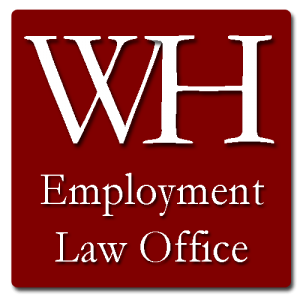New 2021 Employment Laws
Posted December 2020 by S. Ward Heinrichs
NEW 2021 EMPLOYMENT LAWS
(Unless stated otherwise, all new laws go into effect on January 1, 2021)
COVID-19 Laws – Gavin Newsom, Governor of California, signed emergency employment laws related to Covid-19, which went into effect during 2020. I address some of them in greater detail on Ward’s Blog at: https://bestemploymentattorneysandiego.com Below are summaries of some of those new laws:
• Families First Corona Virus Response Act (FFCRA): This was the landmark Federal law that requires businesses that employ fewer than 500 employees to provide 10 days of paid sick leave and up to 10 additional weeks of paid FMLA leave for those who have kids home due to Covid-19. Employees may also get paid sick leave for other Covid related reasons. Employees who can work from home are not eligible for leave. Review the law or my blog for other important details.
• Paid Sick Leave: In California, businesses that employ 500 or more employees or businesses of any size that employ Emergency Responders or Healthcare Workers, must give employees 10 days of paid sick leave for the following reasons: 1) Government quarantine order, 2) Healthcare provider quarantine recommendation, 3) Employer required leave because of Covid-19. If an employee may work from home, that employee is not eligible for this sick leave.
• Safety at Work: Within a day of receiving notice of potential exposure to Covid-19, AB* 685 requires businesses to notify several groups of employees of that potential exposure. Further, within 48 hours, employers must give notice of the potential exposure to the local public health agency. This law goes into effect on January 1, 2021.
• Workers’ Compensation: SB* 1159 created a presumption that workers, who tested positive for Covid-19, contracted the disease at work, if they tested positive during March 19-July 5, 2020. Similarly, First Responders and Healthcare Workers are presumed to have contracted it at work if they tested positive after July 5, 2020.
Dramatic Expansion of California Family Rights Act (CFRA): CFRA leave rights had required businesses who employed 50 or more employees to provide up to 12 weeks of unpaid leave for serious health conditions of an employee, an employee’s spouse, an employee’s kids or parents, or to bond with a baby, adopted child, or a child placed by foster care. Now, under SB 1383, all employers who only employ a minimum of 5 employees must give 12 weeks of unpaid leave for the same reasons. Additionally, the CFRA expands coverage to include grandchildren, grandparents, siblings, and parents-in-law.
New AB5 Exemptions: AB5 was the 2020 law that applied the ABC test adopted by the California Supreme Court case Dynamex**. That was a new test used to determine which workers were employees and which ones were independent contractors. Many workers and businesses objected loudly to AB5. Consequently, the governor signed AB 2257 into law on September 4, 2020, and it immediately went into effect. It granted many new exemptions to the ABC test. For more details review the text of AB 2257 or look at Ward’s Blog on my website: https://bestemploymentattorneysandiego.com In addition, the California voters passed Proposition 22, which gave App-Based driving companies, like Uber and Lyft, exemptions from AB5 and the ABC test.
Board of Directors: In 2019, California required public corporations, with a principal executive office in California, to have one female on their boards. By December 31, 2021 it will require such corporations with 5 members on the board to have 2 women, and boards with 6 or more members to have at least 3 women. Now, AB 979 requires those corporations to have at least one member from an underrepresented community on their boards by the end of 2021. By the end of 2022, those corporations with 4-8 members must have at least 2 members from underrepresented communities, and corporations with 9 or more board members must have a minimum of 3 members from underrepresented communities. A person in an underrepresented community is “an individual who self-identifies as Black, African American, Hispanic, Latino, Asian, Pacific Islander, Native American, Native Hawaiian, or Alaska Native, or who self-identifies as gay, lesbian, bisexual, or transgender.
Minimum Wage & Salary – For California employers with 25 or fewer employees, the minimum wage will be $13 per hour. For employers with more than 25 employees, the minimum wage will increase to $14 per hour. In the City of San Diego, the minimum wage for all employees will be $14 per hour. Minimum salaries required for employees to qualify as exempt are twice the state minimum wage. Accordingly, exempt employees, who work for employers who have 25 or fewer employees, must earn at least $54,080 per year ($13/hour x 2 x 2080 hours/year), and exempt employees, who work for employers who have at least 26 employees, must earn $58,240 per year ($14/hour x 2 x 2080 hours/year).
Sexual Harassment Training: California businesses with at least 5 employees must provide all employees sexual harassment training by January 1, 2021. Supervisors and managers must get 2 hours of training, and all other employees must receive 1 hour of training.
Successor Employer Liability: AB 3075 requires employers who step into the shoes of a previous business/employer must pay outstanding wage judgments against the previous employer. Several factors determine if a business is a “successor” business. Essentially, if a business is purchased and run as it had before, if the ownership or management is the same or similar, or if a new owner or officer is related to an old owner or officer, then the business assumes responsibility for the wage judgments of the previous employer.
*AB means California Assembly Bill and SB means California Senate Bill
** Dynamex Operations West, Inc. v. Superior Court, 4 Cal.5th 903 (Cal. 2018)
S. Ward Heinrichs, Esq.
Employment Law Office of Ward Heinrichs
4565 Ruffner Street, Suite 207
San Diego, CA 92111
858-292-0792
(858) 408-7543 (fax)
